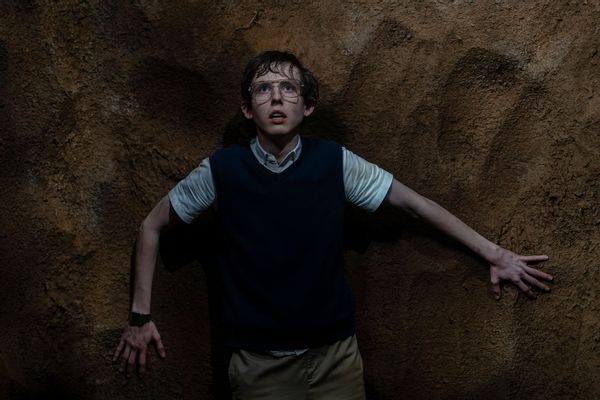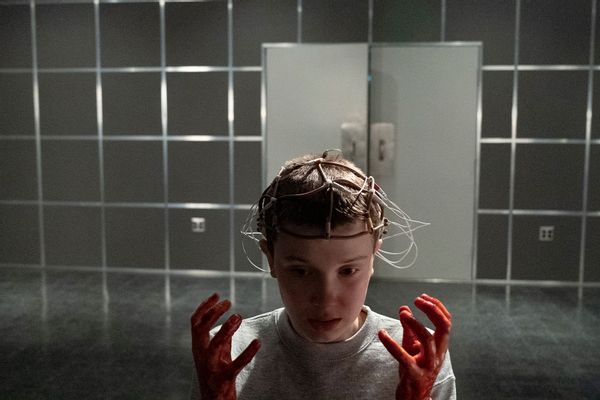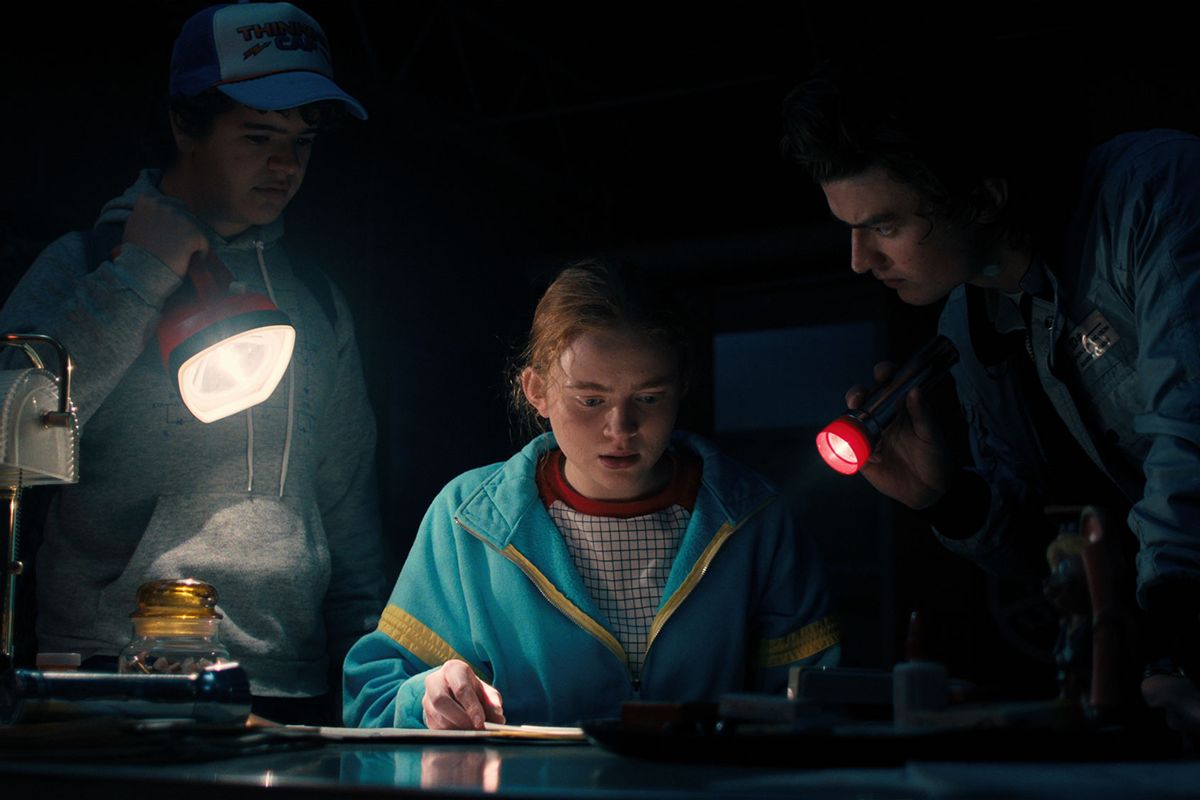A tantalizing two-word phrase handwritten in pen on a sheet of high school stationery seems to offer the key that unlocks the mysteries — both psychological and supernatural — of the first half of the fourth season of "Stranger Things."
Dustin (Gaten Matarazzo), Lucas (Caleb McLaughlin), Steve (Joe Keery) and Max (Sadie Sink) have broken into Hawkins High and are rifling through the files of the school psychologist trying to figure out if there is any connection among the victims of Vecna, the season's snake-veined big bad whose favorite pasttimes include antiquing (that grandfather clock is a real find) and gruesomely mangling the bodies of children as he sucks out their souls. As Max spreads the victims' files out on the darkened desk, a pattern emerges. All had sought counseling for a common set of symptoms, including nightmares, headaches, and nosebleeds. But the kicker comes at the bottom of the page, underlined twice: "past trauma." Vecna, it seems, is a trauma monster, feeding on the anguish of the psychologically vulnerable.
"Past trauma" is a brilliant red herring, and none of Vecna's victims are traumatized. Or perhaps more precisely, none are only traumatized.
It's a clever twist, and more than a handful of critics have taken the bait, arguing that the series offers a "journey into the depths of psychological trauma" that is "surprisingly mature" — and that the figure of Vecna, who preys on "past trauma," allows the series to explore the "trauma response in children and teens."
There's just one problem: "past trauma" is a brilliant red herring, and none of Vecna's victims are traumatized. Or perhaps more precisely, none are only traumatized. Rather, they all have symptoms of a different form of mental illness that psychologists have come to call moral injury.
RELATED: "Stranger Things" and the frustrations of Gen X's '80s nostalgia habit
Most recent research on moral injury has come from work with veterans returning from Afghanistan and Iraq. As the Pulitzer-winner David Wood reports in "What Have We Done: The Moral Injury of Our Longest Wars," though tens of thousands of service members were coming home with debilitating mental illness, they were not responding to standard trauma treatments. This startling revelation led a group of VA psychologists to argue that many were not traumatized; they were morally injured.
Moral injury feels like such an intuitive concept, it's surprising that mental health specialists have only begun to explain it in the last 20 years or so. To understand it, think of the drone strike that killed 10 innocent civilians as the U.S. military pulled out of Afghanistan last year. Both the drone pilot and the families of the dead will likely be haunted by that tragedy, and until recently, we might have called the pain of both parties "trauma." But doing so grates, for perhaps obvious reasons. One person fired the missile; the others lost family members in a grisly conflagration. Sure, all may suffer, but is that suffering uniform? Some specialists now say no, arguing that the pain of victimization (trauma) is qualitatively different from the pain of perpetration (moral injury). They propose a relatively simple definition: moral injury is the mental anguish that sometimes afflicts a person who does wrong, who breaks their own moral code.
Which brings us back to "Stranger Things" — and the real link connecting all of Vecna's victims. All are haunted not by "past trauma," by what was done to them, but by what they have done. They are weighed down by the burden of their perceived misdeeds. Or more simply, this season of "Stranger Things" is an extended meditation on moral injury, and one of the most psychologically fascinating pieces of recent television.
It's easiest to see in Vecna's first victim Victor Creel, played by Kevin L. Johnson and a later version played with surprising pathos by horror legend Robert Englund. Creel's problems begin when he moves into the grand old Victorian house that is also Vecna's lair. Shortly after arriving, the demon begins tormenting Creel and his family and eventually kills his wife and two children. In a flashback scene, we learn why: Creel is a World War II veteran still tormented by his mistaken decision to call in a missile strike on a civilian neighborhood. Exploring the bomb site in the wake of the explosion, Creel sees a baby's cradle on fire and learns the horrible truth. The image of the fiery cradle returns in his nightmares and is the fuel on which Vecna feeds. But it is not a symbol of Creel's victimization — or his trauma. It's a reminder of his complicity in the death of innocents.
 Logan Riley Bruner as Fred Benson on "Stranger Things" (Netflix)
Logan Riley Bruner as Fred Benson on "Stranger Things" (Netflix)
Vecna's second contemporary victim, the nerdy school newspaper reporter Fred Benson (Logan Riley Bruner), has an analogous history. He has scars on his face, the result of a car accident he barely escaped. Fred is plagued by memories of the crash, but not because he nearly died. There was another kid in the car, one who didn't escape and perished in the flames. Though the details of the accident are a little murky, Fred feels responsible for his classmate's death, and Vecna exploits that pain, calling Fred a "murderer" shortly before lifting him up in the air and breaking all his bones.
"What if I'm not good? What if I'm the monster?"
As Max looks at Fred's file in the scene mentioned above, she realizes that she has been suffering from the same symptoms, and as the revelation dawns that she is Vecna's next victim, we hear his disembodied voice mutter her name. But how does Max fit the pattern? Surely she, a victim of domestic abuse forced to witness the death of her brother at the end of Season 3, is traumatized — not morally injured. The letter she reads to her brother in the poignant fourth episode, "Dear Billy," suggests otherwise: "I play that moment back in my head all the time. Sometimes I imagine myself running to you, pulling you away. I imagine that if I had, that you would still be here, and everything would be, everything would be right again." It is this nagging sense of guilt that she could have done more, that she could have prevented her brother's death and didn't, that Vecna feeds on. He reminds her of her failure to do so when he takes Billy's form in the Upside Down.
Psychologists argue that one of the main characteristics of moral injury is a relatively normal guilt response that gets stuck in overdrive (just as PTSD is essentially the hyperfunctioning of an otherwise natural fear response). Many people feel guilty after committing a wrong for a few days or even weeks. But the morally injured — like Creel, Fred, and Max — get stuck in the mire of guilt and shame and find themselves unable to escape.
 Millie Bobby Brown as Eleven in "Stranger Things" (Tina Rowden/Netflix)
Millie Bobby Brown as Eleven in "Stranger Things" (Tina Rowden/Netflix)
And yet it is Eleven who exhibits what is perhaps an even more telling symptom. In scenes meaningfully spliced together with her friends' late-night search of the counselor's office, Eleven meets with Dr. Owens (Paul Reiser) in a desert diner. Owens is trying to convince El to return to Hawkins once more to join the fight against Vecna. But she looks him straight in the eye and demurs, saying, "What if I'm not good? What if I'm the monster?" Here's why she says that: throughout the fourth season, El is beset by memories of her time at Hawkins National Laboratory — and by one bloody recollection in particular. In it, she stands glaring over the blood-spattered corpses of the lab's other test subjects. Over the course of the season, she comes to believe that she only escaped after slaughtering dozens of people with her psychokinetic powers (though later episodes will prove otherwise). Morally injured people often come to feel like they are irredeemable; the evil of their acts infects their very being. They didn't do bad things; they are bad people. They are, in El's term, monsters.
We come to learn later in the season that El is not a monster — and that a more vicious evil lurks in Hawkins. But vicious evil lurks in the real world too. The fourth season of "Stranger Things" was released just days after the school shooting in Uvalde. Given the fact that the premiere opens with a scene of children's dead bodies strewn about what looks an awful lot like a school hallway, the showrunners decided to provide a trigger warning: "We filmed this season of 'Stranger Things' a year ago. But given the recent tragic shooting at a school in Texas, viewers may find the opening scene of Episode 1 distressing. We are deeply saddened by this unspeakable violence, and our hearts go out to every family mourning a loved one."
Want a daily wrap-up of all the news and commentary Salon has to offer? Subscribe to our morning newsletter, Crash Course.
The study of moral injury asks us to remember that those who endure its unique flavor of anguish are not monsters. But it also keeps us in close contact with the monstrous things (like school shootings) human beings are capable of. "Stranger Things" does both of these things too.
Read more
about this topic



Shares